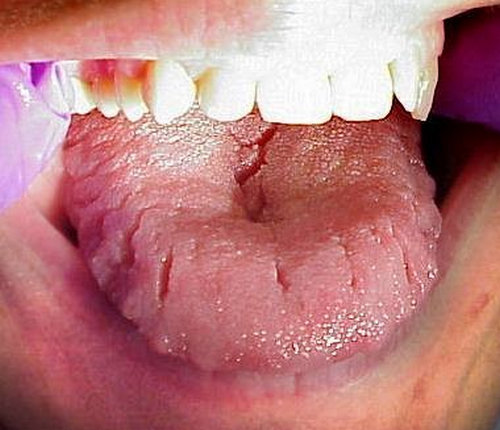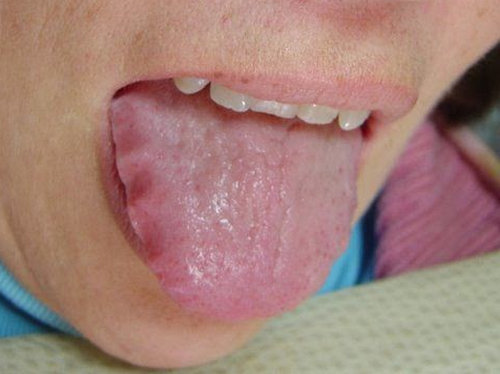Scalloped Tongue
Scalloped tongue is a term used to describe a tongue that has indentations along the sides. It is primarily caused by compression of the tongue against the surrounding teeth.
It is also described as wavy tongue edges, teeth marks on the side of the tongue, and crenated tongue. If the size of the tongue is larger than the usual, it has the tendency to press onto your teeth thereby causing the indentations. (1)

Image 1 : A tongue with severe teeth markings on the sides
Photo Source : scallopedtongue.com
 Figure 2 : A tongue with mild teeth markings on the sides
Figure 2 : A tongue with mild teeth markings on the sides
Picture Source : scallopedtongue.com
What are the symptoms of scalloped tongue?
- A tongue that appears to be enlarged or swollen
- There is a significant fissures and teeth markings on the sides of the tongue
- An abnormally red tongue caused by too much pressure on the edges of the tongue
- Other associated symptoms include pain, sore throat, and halitosis (bad breath). (3)
Causes of scalloped tongue
The scalloped tongue is not a disease itself, but it is an indicator that something not right is happening in your body. There are various causes of scalloped tongue. These are the following:
- Macrogllossia (swollen tongue) – if the tongue has severe swelling, it causes pressure to the dental arches, which will result to a scalloped tongue. There are various causes for swelling of the tongue such as allergy, a result of an existing disease such as hypothyroidism and tongue cancer, and dehydration.
- Thyroid problems – A scalloped tongue can be an indicator that you are having problems with your thyroid. It suggests an underactive thyroid gland or also known as hypothyroidism. The thyroid gland secretes thyroid hormones, which regulate the way the body uses energy and metabolism. Not having sufficient thyroid hormone could lead to slowing down of various bodily processes. Your face, especially your tongue appears swell. Particular s caused by insufficient thyroid hormone level are congenital hypothyroidism, thyroiditis, and Hashimoto’s disease. Aside from scalloped tongue, you will also experience thinning of the hair, hoarseness of voice, fatigue, muscle pain, constipation, drying of the skin, depression, and hypersensitivity to cold. This condition is usually corrected using hormone replacement therapy along with vitamin intake, stress management, and eating nutritious foods. (2, 4)
- Temporomandibular joint syndrome (TMJ) – This condition is characterized by nerve and jaw muscle disorder. It is primarily caused by an injured temporomandibular joint. The usual symptoms include bruxism (tooth grinding), swelling on the sides of the face, clicking or popping jaw, headache, pain when chewing, and nerve inflation. It could lead to jaw instability. As a way of making yourself comfortable, you would try to clench your teeth using your tongue. Doing this regularly could lead teeth markings on the edge of the tongue. If the tongue is not swollen, however, there are still teeth markings on the edge of the teeth, it is an indicator that your lower jaw is narrow. It might also cause by developing a habit of pushing the tongue on the dental arches. The best remedy for temporomandibular joint syndrome is fixing the teeth. If the problem is still there, then the best remedy is to perform a jaw surgical remodelling.
- Sleep apnea – This condition is characterized by one or more pauses in breathing while you are asleep. Sleep apnea can lead to scalloped tongue. If your breathing while sleeping is disrupted, it pulls the tongue back into the oral cavity. (5)
- Spleen QI deficiency – This condition is suspected if the patient has a scalloped tongue along with other problems such as fissured and swollen tongue. With spleen QI deficiency, the spleen can no longer perform its digestive functions. As a result, your tongue looks pale, you get tired easily, unexplainable weight loss, pale face, and lack of appetite.
- Mineral and vitamins deficiency – not having sufficient vitamins and minerals in the body can lead to a condition called megaloblastic anemia (excessive production of red blood cells). It is linked with deficiency in folate and vitamin B12. As a result, you will experience swelling of the tongue along with crenation. This problem can be easily corrected by taking folate and vitamin B12 supplements. You should also increase your intake of folate and vitamin B12 rich foods such as fish, eggs, dairy and poultry products. You should also increase your intake of fortified plant food source. A scalloped tongue is also linked with iron deficiency. Hence, you also need to increase your intake of iron rich foods such as fish, meat, beans, green leafy vegetables, and poultry products. If possible, you have to take iron supplement to give your body its much needed iron. (6, 7)
- Bad habits – There are habits you are not aware that could lead to a scalloped tongue such as clenching, pressing the tongue against your dental arches for an extended period of time, and gridding of the teeth. Some people who are anxious tend to press their tongue against their teeth, which causes tension to the muscles leading to the development of a scalloped tongue.
- Oral cancer – In worse scenario, a scalloped tongue can be an indicator of oral cancer, especially if the tongue has sore or painful fissure.
- Other possible causes – A scalloped tongue can also be an indicator of other abnormalities in the body such as problems in the digestive system, sinus, or arthritis.
How to diagnose a scalloped tongue?
Before choosing the treatment approach for a scalloped tongue, it is important to correctly assess the condition. It is a must to diagnose correctly the presence of a scalloped tongue. The symptoms should be thoroughly examined. The underlying causes for scalloped tongue should be thoroughly assessed. (8)
Treatment options for scalloped tongue
For the scalloped tongue to be fully corrected, the underlying cause should be determined and addressed. As mentioned above, a scalloped tongue is not a disease but an indicator that there is something wrong in your health.
Aside from the treatment of the underlying cause, the patient is advised to maintain a good oral hygiene to prevent secondary infection. In other words, a scalloped disease is generally harmless and does not warrant medical attention, but the underlying cause should be addressed. Not dealing with the underlying cause right away could result to a bigger problem. (9, 10)
References:
- http://www.wowremedies.com
- www.healcure.org
- medmum.com
- heydoctor.org
- health.knowfacts.org
- https://en.wikipedia.org
- www.healthyandnaturalworld.com
- www.braddurhamdmd.com
- health.knowfacts.org
- www.healtreatcure.org